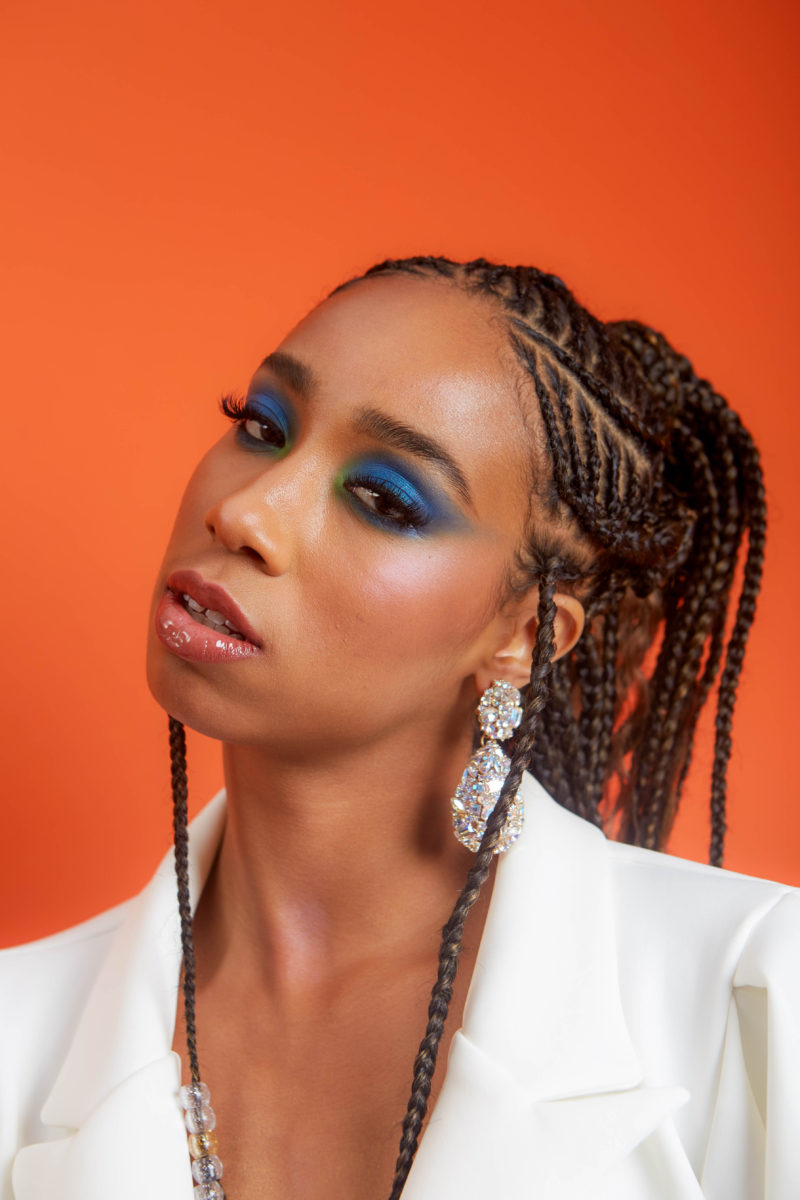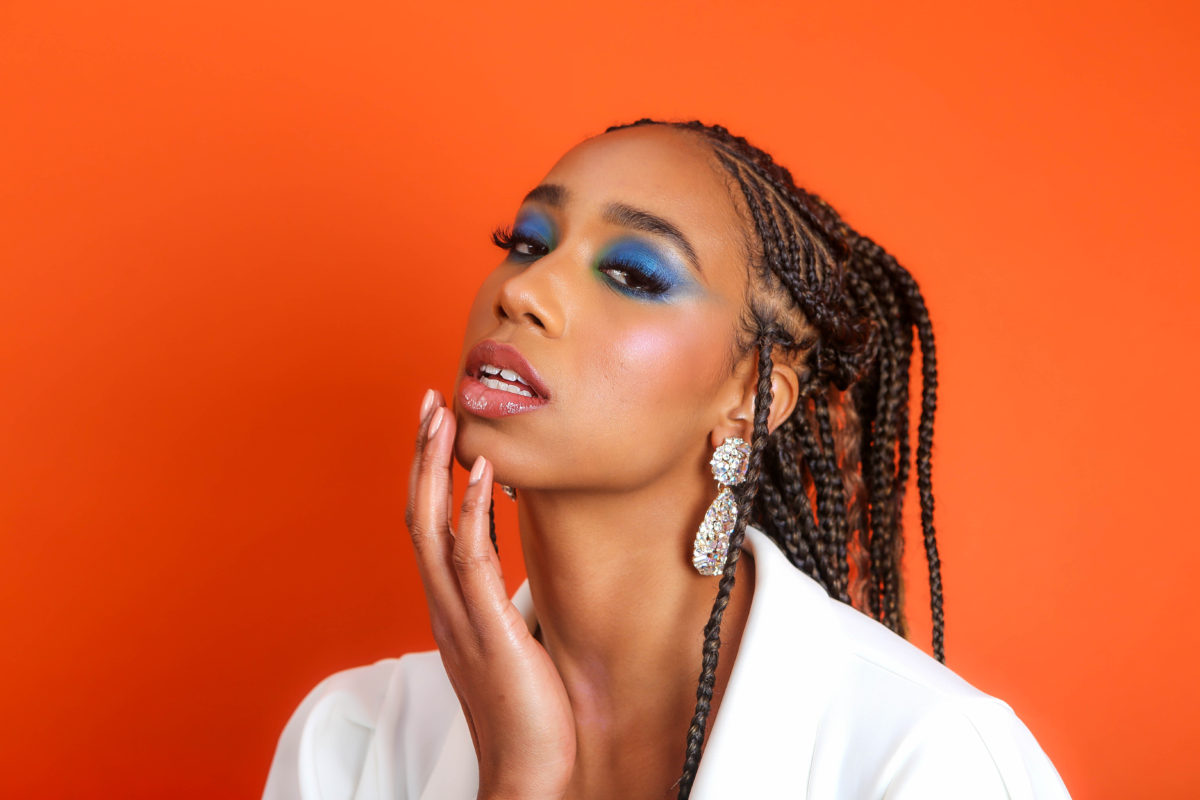Toronto-based singer and songwriter TÖME had quite the year in 2019. From the release of her debut EP TÖMESROOM: Chapter One to touring with Nigerian recording artist Mr. Eazi and opening for heavyweight international artists such as Burna Boy and Wizkid, TÖME carved out an impressive path that’s continued to be fruitful.
She recalls a performance in Birmingham, UK, as a defining moment in 2019. “That moment, that feeling that I got just feeling a whole crowd connect with me, sing my song and they’ve never heard it before … it was a moment of self-appreciation and just knowing that I’m really living my purpose.” She finally felt like she was on the right path in life.
In May of this year, she expanded on her previous musical successes by channeling her unapologetic nature and signature Afro-fusion sound into her sophomore album BT4W (Bigger Than Four Walls). The 10-track album takes listeners on a sonic journey that pays homage to her Nigerian and French-Canadian roots and fully showcases the range of her sultry R&B vocals.
More recently, she dropped the uplifting “I Pray,” featuring Sean Kingston, which has already garnered over 300,000 YouTube views.
We checked in with TÖME to talk about her growth on BT4W, how she’s learned to adapt as an artist during the global COVID-19 pandemic, and what’s next for her following such a successful debut.
The current coronavirus pandemic has severely impacted our day-to-day lives. How has it been adjusting and coping with the new restrictions, both personally and professionally as an artist?
It’s gotten a lot better now, but when COVID first hit, it definitely scrambled me a bit. I felt a little lost. I was like, ‘oh, boy I haven’t been so stagnant in a while.’ The fact that it was so sudden as well and we had so many plans and they’re all getting canceled, it was definitely bringing me down a little bit. I was having a huge lack of inspiration. I wasn’t finding much motivation. We were planning to release the album so that was mainly my focus more so than being in a creative space. We were still busy regardless, however, I felt like creatively and personally things were just a little low for me and building that out over time and sort of finding myself and finding a routine — it’s always a challenge. I still deal with it now, but I feel like we’re in a better position. I have my own studio, which we did get during COVID, and that made a huge difference in terms of just sparking that creativity back … Now I’m in a better place in terms of feeling better, really gaining a lot of inspiration lately and being a lot more aware of myself, my surroundings, my social life, and the people I keep around me.
You released your sophomore album BT4W (Bigger Than Four Walls) in May. What was it like creating an album during these difficult times?
Thankfully, this album was made throughout 2019, which totally helped the whole process because all these songs were made at different times during different vibes. Around the beginning of May is when we were really like, OK, let’s just see what we have and let’s clean it all up. The process of making the album was pretty straightforward and smooth sailing for the most part.

I felt this is really showing my versatility and reach at its finest, and I feel like in a project that’s something very unorthodox.
What was the inspiration behind naming the album BT4W (Bigger Than Four Walls)?
It was actually a sequel to TÖMESROOM, which is the first project we had released. So, in short, we’re now outside of the room. The sounds are more colourful, the vibes are more powerful and automatically it’s ‘bigger than four walls.’ The main reason why I called it that is because I had such an eventful year and I had experienced and seen so much and created so much music that regardless of how this project was going to go, whatever songs that we were going to put on it, you could tell there’s a story there. I felt this is really showing my versatility and reach at its finest, and I feel like in a project that’s something very unorthodox. This project was bigger than me. It was bigger than what we’re used to and so it’s bigger than four walls because I’m bringing something new.
With BT4W, I found a lot of the songs were very different, but the vibe was the same. “Free” immediately stood out to me because it begins different than the others. You have a melodic opening transitioning to the upbeat, high tempo, hip swaying type of track that we have come to know to be your style. What was the production and songwriting process on that track?
I made that song in Atlanta and when I first made it, I just heard that melodic beginning and the moment that beat dropped I sang, “oh, oh” right away. I was like, ‘oh, put me in the booth, put me in the booth!’ I just freestyled that whole hook that everyone knows. It was truly off the moment and then afterwards I wrote with a team of about two writers and the engineer as well, a great production team. I must say that they really helped me. I wrote majority of the song, but their guidance was wonderful. I didn’t think about what I was going to say, it just came out and I felt like it was resonating with the beat.
Do you plan on building on that type of melodic vibe in future work?
For me, it always depends on the vibe and the message of the song. I do really love melodic beats generally. It is in my repertoire and I have a lot of songs like that with those beginnings, so you should definitely expect more of it. In terms of when they will come out, I’m not so sure but it’s definitely going to be there.
On your latest collaboration, “I Pray” with Sean Kingston, you really hit home on your call to action of maintaining peace during troubled times. How did this collaboration come about and what inspired the track itself?
Shout out to my team! Carmen Jones was actually the one who knew a lot of people within Sean Kingston’s team. When I had created the song initially, he sent it out to them to see what Sean would think and they really liked it and were willing to work with me on it. I truly respect him for taking on my project and doing it justice. The inspiration behind the song was actually an Instagram live around April. In that period where I was so down in a rut that we were in COVID and locked down and there was a lot of racial injustice starting to be brought up. I was on Instagram live with the producer. He played that beat and I literally wrote the whole song. It was inspired by what 2020 has been. It’s been filled with ups and downs and just trying to keep faith, and let God lead or let your purpose, or whatever it is that makes you move or motivate you every day, lead you and just give your all to it … because it can be hard to keep faith. That was really the main point of the song.

Music has always been such an important role in revolutions and through bad times and through good times, music is the translation of those situations.
With the current #EndSARS movement that’s going on calling for the disbanding of the Special Anti-Robbery Squad (SARS) in Nigeria amid claims of police brutality and abuse, you’ve been using your platform to amplify those messages and recently participated in a protest. Why is it important for you to get involved publicly with this movement?
As a Nigerian with a platform, I think it’s important for me to shed light on it, because I do have an audience of people who had no idea what was going on until I said something. I wasn’t born in Nigeria, however, I visited different years of my life and I’ve seen the amount of injustice and brutality that we’ve been dealing with for a very long time. The system hasn’t been fair to its people. The government hasn’t looked out for its people and that’s nothing new. The fact that this movement has taken on such global exposure and just [seeing] how much people are fighting back home, it was like, I need to fight with you. It’s a tough conversation to have, it’s a tough situation to be in generally, but I have to speak on it, and I have to make sure that everyone who supports me, knows that this is what I support, and this is what is moving me right now.
Do you think that the industry and other prominent artists are doing enough to show their support and highlight the issue?
I definitely think we’re trying our best. There’s only so much that celebrities are in any position to really be able to do, because at some point this becomes a political situation. When it comes to politics and media, it’s definitely had its contradictory communication. I think that in my personal view, from what I’ve seen, there’s a lot of artists who have been very much in the forefront and have been very vocal. There’s a lot of artists who have been quiet, which is really disappointing because they have collaborations with African artists, they’ve had affiliation with African music and have said nothing. But for those who are trying, they’re trying their best.
With everything going on in the world right now, how do you feel that music can act as a tool to instill hope and uplift people through such difficult and uncertain times?
Music is such a beautiful way of communicating. We use music as a form of activism and we’ve used it from like the dawn of time to communicate and to just use as a message to move forward and to look forward or bring awareness to something. Music has always been such an important role in revolutions and through bad times and through good times, music is the translation of those situations. I think that it’s what we need, it’s necessary. Music is like a drug. It’s sort of this feeling that takes over you and makes you feel better.
Photos by Danica Rose supplied courtesy of artist




Comments are closed.